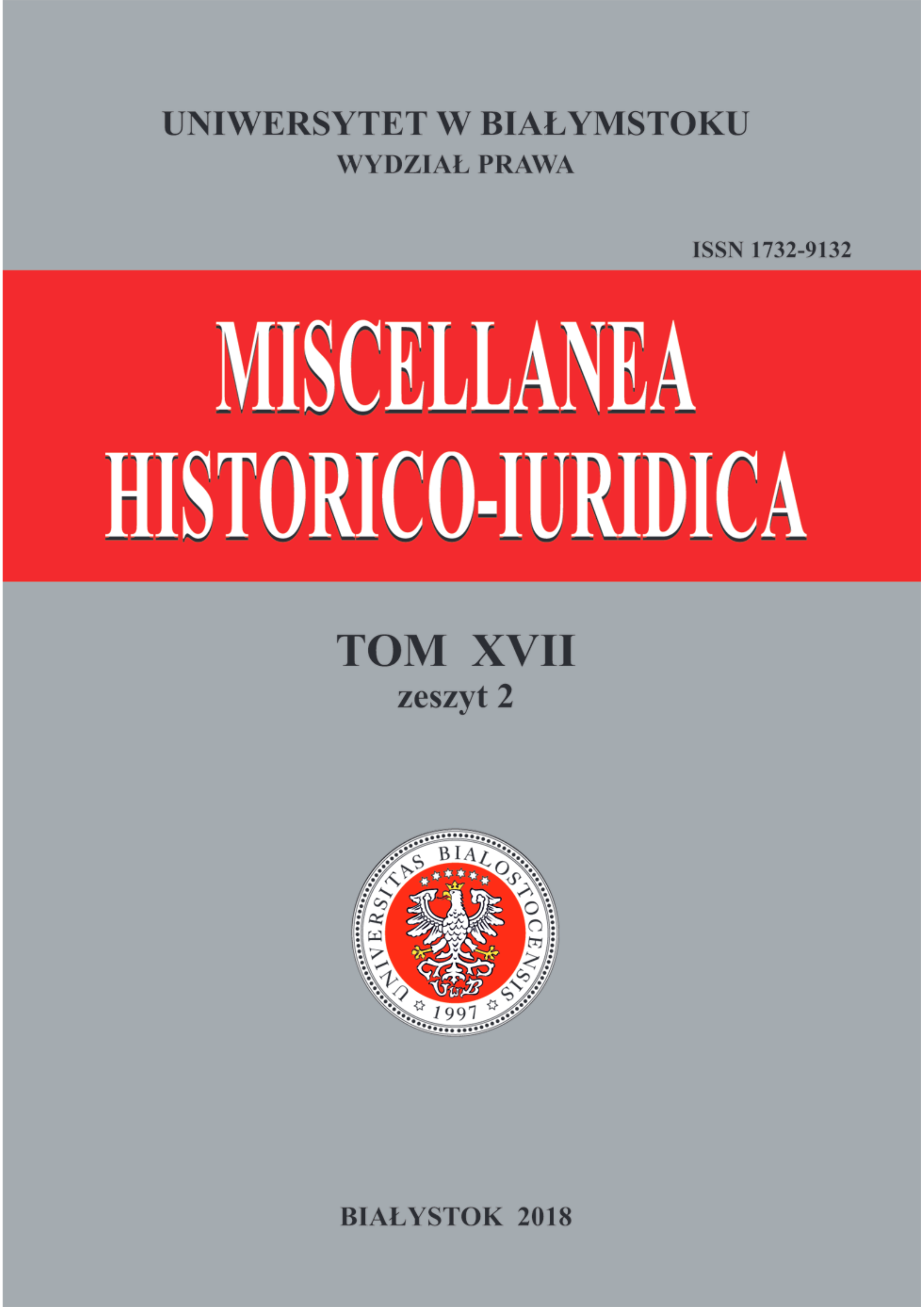The Emperor Hadrian’s edict on the oil
Keywords:
emperor, Hadrian, edict, Athens, oilAbstract
Emperor Hadrian was known for his sympathy for Greek culture. As a result of this he passed a statute regulating the sale of fish in Attica. However, the Emperor paid particular attention to Athens and decided to pass an imperial constitution (edictum) regulating the oil trade. The document has been preserved on the western gate of the Roman forum, but in a few places it contains gaps in the text that unleash its full analysis. The preserved regulation allows to show the sense of Emperor Hadrian’s market policy. The main issue was to regulate the sale of oil and its supplies to Athens, with simultaneous indication of crimes and penalties as well as the procedure before the administration of justice in the event of violation of the provisions of the edictum Hadriani de re olearia.
References
Digesta Iustiniani. Digesta Justyniańskie, red. T. Palmirski, t. VII.2, księgi 48-50, Kraków 2017.
Purpura G., Le costituzioni imperiali nei papiri e nelle epigrafi. Elenico. Edictum Hadriani de re olearia, [w:] Revisione ed integrazione dei Fontes Iuris Romani Anteiustiniani (FIRA). Studi preparatori, I, Leges, a cura di G. Purpura, Torino 2012.
Amielańczyk K., Rzymskie prawo karne w reskryptach cesarza Hadriana, Lublin 2006.
Birley A.R., Hadrian. Cesarz niestrudzony, przekł. R. Wiśniewski, Warszawa 2002.
Blázquez Martínez J. M., La epigrafía de castulo, Consideraciones históricas, „Dacia” 1978, nr 22.
Casavola F., Giuristi adrianei, Roma 2011.
D’Orgeval B., L’empereur Hadrien. Oeuvre l ́egislative et administrative, Paris 1950.
Dean Meritt B., Inscriptions from the Athenian Agora, Princeton 1966.
Dickenson Ch.P., On the Agora: The Evolution of a Public Space in Hellenistic and Roman Greece (c. 323 Bc – 267 ad), Leiden and Boston 2016.
Domingo P., La ley olearia de Adriano: la democracia ateniense y el imperialismo romano, „Gerión” 1992, nr 10.
Duncan-Jones R., Structure and Scale in the Roman Economy, Cambridge 1990.
Dürr J., Die Reisen des Kaisers Hadrian, Wien 1881.
Dydyński T., Cesarz Hadrian. Studium historyczno-prawne, Warszawa 1899.
Encyclopedia of the History of Classical Archaeology, red. N. Thomson de Grummond, London 1996.
Fornell Muñoz A., Lex Hadriana de Rudibus agris y lex olearia: dos importantes medidas legislativas de la política agraria del emperador Adriano, [w:] Reflexiones sobre jurisdicciones especiales, red. M. Fernández Rodríguez, L. Martínez Peñas, Valadoid 2016.
Giomaro A.M., Un’introduzione sui mercati di Roma, „Studi urbinati” 2018, t. 69, nr 1-2.
Gualandi G., Legislazione Imperiale e Giursprudenza, Milano 1963.
Harter-Uibopuu K., Hadrian and the Athenian Oil Production, Feeding the Ancient Greek City, [w:] Groningen-Royal Holloway Studies on the Greek City after the Classical Age, red. O. Alston, O. van Nijf, t. 1, Leuven 2008.
Höbenreich E., Annona. Juristische Aspekte der stadtrömischen Lebensmittelversorgung im Prinzipat, Graz 1997.
Hoff M.C., The Early History of the Roman Agorain Athens, [w:] The Greek Renaissance in the Roman Empire, red. S. Walker, A. Cameron, London 1989.
Hoff M.C., The Roman Agora at Athens, Diss. Boston 1988.
Iozzo M., Sztuka i historia Grecji, Łódź 1999.
Kłodziński K., ‘Officia maxima et principes officiorum’, Problematyka badań nad kancelarią cesarską okresu pryncypatu na przykładzie sekretariatu ‘a memoria’, Kraków 2012.
Kłodziński K., Udział sekretarzy ab epistulis i a libellis w procesie tworzenia reskryptów cesarskich, „Studia Iuridica toruniensia” 2011, nr 8.
Kuryłowicz M., Crimen artioris annonae, „Res Historica” 2010, nr 29 (Terra, mare et homines II : Studies in memory of Prof. Tadeusz Łoposzko).
Kuryłowicz M., Przestępstwa spekulacji contra annonam w prawie rzymskim, „Folia Societatis Scientiarum Lublinensis” 1993, nr 34.
Martin F., De re olearia: la ley ateniense de Adraino y el rescripto de Cástulo, [w:] Estudios sobre el monte Testaccio (Roma), red. J. M. Blázquez Martínez, J. Remesal Rodríguez, t. 2, Barcelona 2001.
Martín F., Las constituciones imperiales de Hispania, [w:] Roma y las provincias: realidad administrativa, Madrid 1994.
Morawski K., Dwaj cesarze rzymscy Tyberyusz i Hadryan, Kraków 1893.
Mrabet A., In Africa et in Hispania, Barcelona 2007.
Niczyporuk P., Tadajczyk K. t., Reskrypt cesarza Hadriana o szkole epikurejskiej w Atenach, „Miscellanea Historico-Iuridica” 2014, t. 13.1.
Ozcáriz Gil P., Administración de la provincia Hispania citerior durante el alto Imperio Romano. Organizacion territorial, cargos administrativos y fiscalidas, Barcelona 2014.
Parnicki-Pudełko S., Budownictwo starożytnej Grecji w okresach od archaicznego do rzymskiego, Wrocław 1962.
Parnicki-Pudełko. S, Agora: geneza i rozwój rynku greckiego, Wrocław 1957.
Plácido Suárez D., La ley olearia de Adriano: la democracia ateniense y el imperialismo romano, „Gerión. Revista de Historia Antigua” 1992, nr 10.
Purpura G., I papiri e le fonti giuridiche pregiustinianee, [w:] Ravenna capitale: permanenze del mondo giuridico romano in occidente nei secoli V–VIII: instrumenta, civitates, collegia, studium iuris, red. G. Bassanelli Sommariva, S. Tarozzi, P. Biavaschi, Santarcangelo di Romagna 2014.
Rizzi M., Legislazione di mercato ad Atene attraverso la documentazione epigrafica. Dalla fine dell’etŕellenistica all’epoca imperiale, Canterano 2016.
Rotroff S.I., Oakley J.H., Debris from a Public dining Place in the Athenian Agora, Princeton 1992.
Rovira-Guardiola R., Reshaping the Empire: Hadrian‘s Economic Policy, [w:] Hadrian. Arts, Politics an Economy, red. T. Opper, London 2013.
Thompson H.A., Wycherley R.E., The agora of Athens: the history, shape and uses of an ancient city center, Princeton 1972.
Willers, Hadrians panhellenisches Programm: archäologische Beiträge zur Neugestaltung Athens durch Hadrian, Basel 1990.
Wycherley R.E., Pausanias in the Agora of Athens, „Greek, Roman, and Byzantine Studies” 1959, nr 2.







